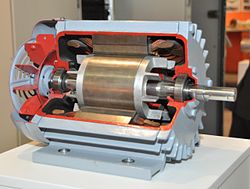Read more about Centrifugal Compressor
Centrifugal Compressor is one of the types of compressors. In this post, we talked about how it works, its types, and comparing it with several other compressors.
The radial compressor is also called a centrifugal compressor. This kind of dynamic compressor has a radial design. They operate at constant pressure and any changes in the external conditions will affect the performance of these compressors.
Centrifugal compressors, sometimes called radial compressors, are a sub-class of dynamic axisymmetric work-absorbing turbomachinery.
They achieve a pressure rise by adding kinetic energy/velocity to a continuous flow of fluid through the rotor or impeller.
Types of Centrifugal Compressor
- Multi-Stage Compressor
Multi-stage compressors are among different types of centrifugal compressors. As the name suggests, this compressor has been designed to pass the gas through multiple stages for diverse purposes. Multi-stage compressors are used when a single-stage compressor can’t keep up with the desired pressure requirements. This is because a single-stage compressor, as mentioned above, has only one impeller.
The simple explanation regarding “how does a centrifugal compressor work?” would be that they transform the velocity and the kinetic energy in the diffuser into the pressure energy.
There is a rotating impeller inside centrifugal compressors that has radial blades and the center of this impeller receives the air that is pushed by centrifugal force toward the center.
Differences Between Axial Compressor & Centrifugal Compressor:
- Axial compressors are very expensive while centrifugal compressors are cheaper and have a wider operating range.
- The mass flow rate in centrifugal compressors is less than 15 Kg/s and in the axial compressors is very large (more than 100 Kg/s).
- Axial compressors operate more efficiently (about 94%) than centrifugal compressors (about 87%).
- Efficiency
- The efficiency of the rotary compressor is nearly 100%.
- The efficiency of the reciprocating compressor is less than 100%.




Comments
Post a Comment